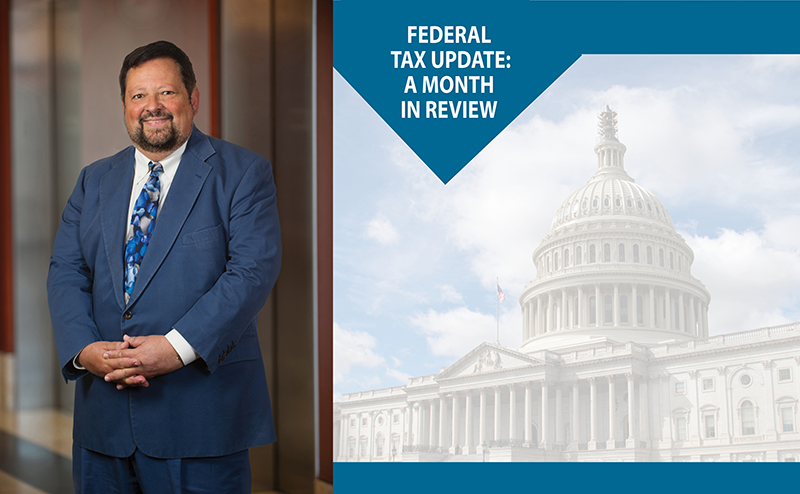March 1st, 2022
February Federal Tax Update
Posted in: Tax Law Tagged: David S. De Jong
Author: David S. De Jong

INDIVIDUALS
In Hicks v. Commissioner, TC Memo 2022-10, the noncustodial father of a child was permitted the dependency allowance although no Form 8332 was submitted with the return; the taxpayer provided a copy of a Shared Parenting Plan that had all information required on the 8332 except for the social security numbers of the parents.
In Harwood v. Commissioner, TC Memo 2022-8, the Tax Court allowed most pre-2018 travel expenses of a union steamfitter who traveled through Oregon and Washington doing temporary jobs; the Court found that his “tax home” was in Yakima, Washington, with his family despite no actual jobs in that city for a number of years as Yakima was centered in his region and that he kept good records of his expenses.
RETIREMENT AND ESTATE PLANNING
Proposed Regulations under Code Section 408 take 275 pages to explain the changes to the Minimum Distribution Rules as a result of the 2019 SECURE Act.
In United States v. Allison, 129 AFTR2d 2022-________, a California Federal District Court included in a decedent’s estate funds represented by a pre-death cashiers check for a relative’s child support which was rejected by the state agency and reissued post-death.
In Estate of Levine v. Commissioner, 158 TC No. 2, the Tax Court held that a split dollar life insurance policy owned by an irrevocable trust was not part of a decedent’s estate; only the value of the split dollar receivable representing debt to the decedent was includible.
IRS Publication 970 was revised to make it clear that taxable scholarships and fellowships including those not reported on a W-2 form the basis for IRA contributions.
BUSINESS
In Isaacson v. Commissioner, 129 AFTR2d 2022-________, the Ninth Circuit Court of Appeals agreed with the Tax Court that an attorney was in receipt of funds from a settlement not placed in a trust account but rather in an investment account controlled by the attorney and from which he did disbursements including $50,000 to his trainer.
In Deeb v. Commissioner, 129 AFTR2d 2022-________, a Georgia Federal District Court determined that an individual who founded a company in Azerbaijani and spent 60 percent of his time there and only 18 percent of his time in Atlanta at the situs of the family home could not deduct travel expenses overseas as he had shifted his tax home.
In Sonntag v. Commissioner, TC Summary Opinion 2022-3, the Tax Court denied a musician deductions for stage costumes (to the extent the clothes could be worn for general use), breathing exercises, meditation techniques and supplement oil as well as for hair, nail and teeth care.
In Larson v. Commissioner, TC Memo 2022-3, the Tax Court held that there is not a substantial risk of forfeiture of stock where employment restrictions were unlikely to be enforced.
In United States v. Weathers, 129 AFTR2d 2022-660, a Washington Federal District Court threw out an “alter ego” argument of IRS which had alleged that three entities of the couple were their nominees and that they transferred property fraudulently for avoiding tax liens; the Court found that two of the entities were owned by the third and that the couple were never owners, Board members or in a position to exercise control over the business or receive personal benefits.
In Slone v. Commissioner, TC Memo 2022-6, the Tax Court once again found that transferee liability applied when stock in a C corporation with significant built-in gain was sold after depleting the corporation of funds to pay the taxes.
In Donoghue v. Commissioner, No. 21-6737, the US Supreme Court declined to hear an appeal from the First Circuit Court of Appeals which had sustained a Tax Court decision finding that the breeding, racing and selling of horses was not an activity engaged in for profit where there was not a single year with positive earnings in 30 years.
The Large Business and International Division of IRS added to its active campaigns an effort to stop deduction of partnership losses in excess of basis.
In an FAQ, IRS indicated that it would not require partnerships and S corporations without foreign activity or foreign partners to file new schedules K-2 and K-3 in 2022.
In Chief Counsel Advice 202204007, IRS ruled that a C corporation which provides a search website for rental properties is a broker company and ineligible for the exclusion under Code Section 1202 for qualified small business stock.
In Letter Ruling 202205018, IRS granted relief when the consent to be treated as an S corporation was signed by a second spouse and not the original spouse who was to be an owner.
PROCEDURE
In Maehr v. State Department, at 128 AFTR2d 2021-5256, the US Supreme Court declined to hear an appeal from the Tenth Circuit Court of Appeals which had sustained a Colorado Federal District Court decision rejecting a constitutional challenge to the ability of IRS to obtain passport revocation through the State Department for “seriously delinquent tax debt.”
In Jones v. United States, 129 AFTR2d 2022-588, the Ninth Circuit Court of Appeals agreed with the Tax Court that a former wife “tacitly consented” to the filing of a joint return which she did not sign, by virtue of providing the tax information and not filing a separate return; the Court then found that the factors on balance weighed against providing innocent spouse relief, most particularly knowledge of the likely inability to pay the liability and a history of noncompliance.
In Fiengo v. Commissioner, in a Bench Opinion the Tax Court denied innocent spouse status to a divorced wife who handled all of the finances and bill payments, the Court finding all other factors neutral but her knowledge of the underpayment weighed heavily against relief.
In IRS v. Ransdell, 129 AFTR2d 2022-579, a Florida Federal District Court agreed with a Bankruptcy Court that living a lavish lifestyle with excessive personal spending and even large discretionary expenditures is not sufficient standing alone to deny discharge of a bankrupt from an obligation to IRS otherwise eligible for discharge.
A revision to Internal Revenue Manual 13.1.7 created four new categories of matters that can be referred to the Taxpayer Advocate including account related issues generated from a Congressional office, passport related issues, private collection agency federal tax collection matters and automatic revocations of tax-exempt status for failure to file the required annual return or notice for three consecutive years.
In Notice 2022-31, IRS announced that it will suspend the mailing of certain notices given the backlog in processing returns, particularly those prepared on paper; these notices include those for unfiled returns and pre-CDP notices of unpaid balances.






